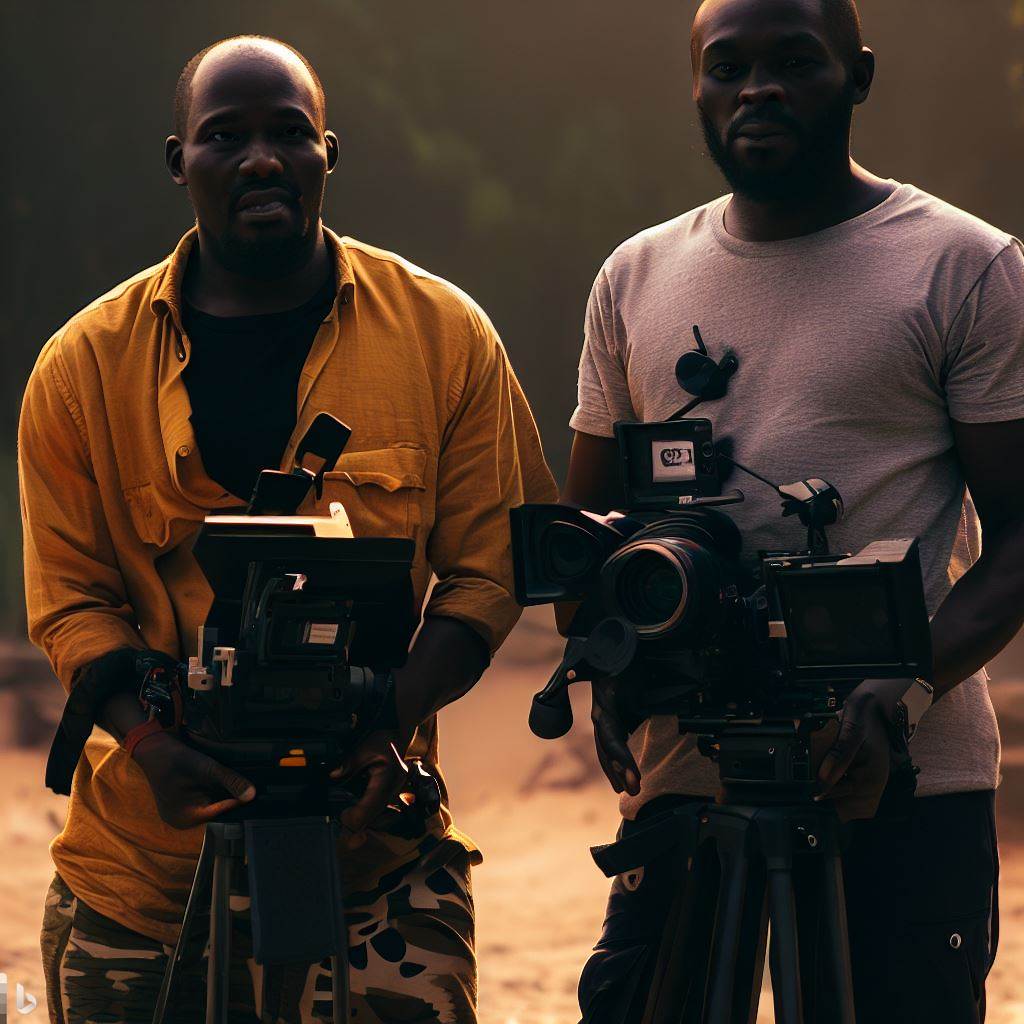Introduction
Scriptwriting is a crucial aspect of the Nigerian film industry, also known as Nollywood.
As this industry continues to grow and become more competitive, it is essential for scriptwriters to possess certain skills.
These skills are vital for ensuring success in an industry that demands creativity, storytelling prowess, and the ability to captivate audiences.
Importance of Essential Skills
In a highly competitive industry like Nollywood, possessing essential skills as a scriptwriter is of utmost importance.
These skills enable scriptwriters to stand out from the crowd and create compelling stories that resonate with audiences.
The ability to effectively communicate ideas, develop engaging characters, and construct well-structured narratives is essential for achieving success in a highly saturated market.
Additionally, possessing these skills allows scriptwriters to navigate the ever-changing dynamics of the industry and adapt to new trends and demands.
This flexibility and versatility are vital in order to stay relevant and maintain a competitive edge.
Furthermore, these skills serve as a foundation for scriptwriters to collaborate effectively with directors, producers, and actors, leading to the production of high-quality films that captivate and entertain audiences.
The importance of these skills cannot be overstated, as they not only determine the success of individual scriptwriters but also contribute to the overall growth and reputation of the Nigerian film industry.
Basically, the skills required for a successful scriptwriter in Nigeria play a crucial role in an industry characterized by fierce competition.
These skills enable scriptwriters to create unique and engaging stories, adapt to industry demands, and collaborate effectively with others
Developing and honing these essential skills is paramount for scriptwriters who aspire to excel in the highly competitive and ever-evolving landscape of Nigerian cinema.
Understanding Nigerian Culture: A Key to Successful Scriptwriting
In the world of scriptwriting, one crucial aspect that often gets overlooked is the understanding of Nigerian culture.
As a scriptwriter in Nigeria, it is essential to grasp the significance of this cultural understanding and incorporate it into scripts.
By doing so, scriptwriters can create relatable and authentic stories that resonate with Nigerian audiences.
A. The significance of understanding Nigerian culture in scriptwriting
Firstly, understanding Nigerian culture is imperative because it forms the foundation of storytelling.
Culture shapes the values, beliefs, and behaviors of a society, and these elements are vital in creating realistic and engaging characters.
By delving deep into Nigerian culture, scriptwriters gain insights into the norms, traditions, and social dynamics that drive their target audience.
This understanding allows them to craft narratives that capture the essence of Nigerian life, making the stories more relatable and believable.
B. Importance of incorporating cultural elements into scripts
Incorporating cultural elements into scripts is of utmost importance.
This practice not only adds depth and richness to the storytelling but also helps scriptwriters establish a connection with the audience.
When the audience sees their own culture being presented on screen, they feel seen and validated.
This emotional connection enhances their engagement with the story, leading to a more immersive viewing experience.
C. Examples of successful scripts that effectively portray Nigerian culture
To illustrate the significance of incorporating Nigerian culture into scripts, let’s take a look at some successful examples.
One notable script that effectively portrayed Nigerian culture is the movie “The Wedding Party.” This romantic comedy intertwined elements of traditional Nigerian weddings, such as attire, rituals, and music, with a modern love story.
As a result, the film resonated strongly with Nigerian audiences, becoming a massive box office success and a cultural phenomenon.
Another example is the TV series “Tinsel,” which has been running for over a decade.
Set in the Nigerian entertainment industry, the show tackles various social issues while incorporating Nigerian cultural references seamlessly.
By blending local customs, language, and fashion, “Tinsel” has managed to captivate audiences and maintain a loyal fan base throughout its long run.
Such success stories demonstrate how understanding and incorporating Nigerian culture can lead to the creation of compelling and enduring scripts.
Beyond entertainment value, incorporating cultural elements also serves as a vehicle for cultural preservation and education.
By showcasing aspects of Nigerian culture in scripts, scriptwriters contribute to the promotion and preservation of their heritage.
They provide a platform for cultural exchange and understanding, both within Nigeria and globally, fostering a sense of pride and appreciation for Nigerian culture.
To sum it up, understanding Nigerian culture is indispensable for scriptwriters in Nigeria.
It not only forms the foundation of storytelling but also allows scriptwriters to create relatable and authentic narratives.
By incorporating cultural elements into scripts, scriptwriters establish a connection with audiences, leading to more immersive viewing experiences.
Successful scripts like “The Wedding Party” and “Tinsel” serve as prime examples of how effectively portraying Nigerian culture can captivate audiences and contribute to cultural preservation.
As scriptwriters, we must embrace and celebrate Nigerian culture, harnessing its power to create compelling and impactful stories.
Read: How to Navigate Legal Issues as a Concert Promoter in Nigeria
Strong Storytelling Abilities
A. Importance of strong storytelling skills in scriptwriting
One of the most essential skills for a successful scriptwriter in Nigeria is strong storytelling abilities.
This skill is crucial because it is the foundation of any compelling script.
Without a captivating story, a script will fail to engage and connect with its audience.
B. The elements of a compelling story, such as plot, character development, and conflict
There are several elements that contribute to a compelling story.
First and foremost, a well-developed plot is necessary. The plot should have a clear structure with a beginning, middle, and end.
It should also have a strong central conflict that drives the story forward and keeps the audience invested.
The characters in a script are another crucial element of storytelling.
They need to be relatable, three-dimensional, and have clear motivations. Audiences need to care about what happens to the characters and be emotionally invested in their journey.
Furthermore, conflict is an essential part of any good story. It creates tension and keeps the audience engaged.
Conflict can be external, such as a battle or a chase, or internal, such as a character’s inner struggles.
The more conflict there is in a story, the higher the stakes, and the more invested the audience becomes.
C. Tips on how to improve storytelling abilities
Improving storytelling abilities is a constant process, but there are several tips that can help scriptwriters in Nigeria enhance their skills:
- Read widely: Reading books, scripts, and other forms of literature can expose scriptwriters to different storytelling techniques and styles.
- Study successful scripts: Analyzing scripts of successful films or TV shows can provide valuable insights into what makes a compelling story.
- Watch films and TV shows critically: Pay attention to the plot structure, character development, and conflict in the stories you watch. Take note of what works and what doesn’t.
- Practice writing regularly: Just like any skill, storytelling abilities improve with practice. Set aside dedicated time for writing and challenge yourself with different genres and themes.
- Seek feedback: Join writing groups or workshops where you can get constructive criticism on your scripts. Feedback from others can help you identify areas for improvement.
- Experiment with different storytelling techniques: Don’t be afraid to try unconventional storytelling methods, such as non-linear narratives or unreliable narrators. Pushing the boundaries can make your script stand out.
- Embrace collaboration: Working with others, such as directors, actors, and fellow writers, can enrich the storytelling process. Collaborative brainstorming can lead to fresh ideas and perspectives.
- Learn from failures: Not every script will be a success, but each failure is an opportunity to learn and grow. Reflect on what worked and what didn’t in order to improve for the future.
In a nutshell, strong storytelling abilities are vital for a successful scriptwriter in Nigeria.
A compelling story with a well-developed plot, interesting characters, and conflict can captivate audiences and leave a lasting impact.
By continuously improving their storytelling skills through reading, studying, practicing, and seeking feedback, scriptwriters can increase their chances of creating engaging and memorable scripts.
Read: Inside the Nigerian Film Industry: Scriptwriting Focus
Adaptability and Empathy
A. Explaining the need for adaptability and empathy in scriptwriting
Scriptwriting in Nigeria requires both adaptability and empathy to resonate with diverse audiences and address various societal challenges.
Adaptability is crucial because it allows scriptwriters to tailor their stories and characters to the ever-evolving cultural landscape.
Nigerian society is multifaceted, with a diverse range of cultural, religious, and social backgrounds.
Scriptwriters must understand and respect these differences to create narratives that truly connect with their target audience.
Furthermore, empathy plays a fundamental role in scriptwriting as it enables writers to authentically portray the experiences and perspectives of different individuals.
By putting themselves in the shoes of others, writers can capture the nuances and complexities of characters, giving them depth and relatability.
B. The importance of understanding different perspectives and experiences
Understanding different perspectives and experiences is vital for scriptwriters in Nigeria to foster inclusivity and accurately reflect the realities of their audiences.
Nigerian society comprises people from various ethnic groups, economic backgrounds, and religions.
Failing to acknowledge these differences can result in scripts that are disconnected from the lives and aspirations of their viewers.
By acknowledging and incorporating diverse perspectives, scriptwriters have the opportunity to challenge stereotypes, break barriers, and foster social change.
This understanding allows them to address relevant issues effectively and engage audiences on a deeper level.
For example, incorporating stories that shed light on societal issues like gender equality, corruption, or poverty can spark conversations and inspire positive change.
C. Examples of how adaptability and empathy can enhance scriptwriting in Nigeria:
Adaptability and empathy can greatly enhance scriptwriting in Nigeria by enabling writers to create powerful narratives that resonate with the audience.
Here are a few examples:
- Adaptability: Scriptwriters can adapt their storytelling techniques and narrative structures to suit the preferences of different regions within Nigeria. This includes considering language variations, cultural references, and local customs.
- Empathy: By empathizing with marginalized communities, scriptwriters can shed light on their struggles and amplify their voices. This involves researching and understanding their unique challenges, incorporating authentic representations, and providing nuanced perspectives.
- Adaptability: Nigeria’s film industry, Nollywood, is renowned for its ability to produce movies quickly and on a relatively low budget. Scriptwriters must adapt their storytelling techniques to deliver impactful and emotionally engaging narratives within these production constraints.
- Empathy: Understanding the audience’s emotional triggers allows scriptwriters to create compelling characters and storylines that elicit genuine emotional responses. By tapping into the audience’s emotions, scripts can leave a lasting impact and resonate with viewers.
In short, adaptability and empathy are indispensable skills for scriptwriters in Nigeria.
These qualities enable writers to tailor their stories to diverse audiences, understand different perspectives, and create narratives that evoke emotions and spark meaningful conversations.
By embracing adaptability and empathy, scriptwriters can contribute to the growth and development of the Nigerian film industry while addressing critical societal issues.
Read: Career Spotlight: Interview with a Nigerian Scriptwriter
Research and Attention to Detail
Research and attention to detail are essential skills for a successful scriptwriter in Nigeria. These skills not only enhance the authenticity of scripts but also provide a strong foundation for storytelling.
In this section, we will discuss the significance of research in scriptwriting, explain how attention to detail can improve authenticity, and provide tips on conducting thorough research.
A. Significance of Research in Scriptwriting
Research forms the backbone of any script. It is the process of gathering relevant information and knowledge that helps bring a story to life.
By conducting in-depth research, scriptwriters can create believable characters, settings, and plotlines.
Research helps scriptwriters understand the cultural, historical, and social contexts in which their story is set.
It helps them avoid misrepresentations and stereotypes, ensuring that the script resonates with the target audience and reflects the intricacies of Nigerian society.
B. Improving Authenticity through Attention to Detail
Attention to detail is crucial for scriptwriters as it enhances the authenticity and credibility of their scripts.
Paying attention to even the smallest details can create a more immersive experience for the audience.
When scriptwriters demonstrate a keen eye for detail, it shows that they have invested time and effort in understanding the nuances of their story.
It helps establish trust with the audience and makes the script more relatable.
C. Tips for Conducting Thorough Research
- Identify reliable sources: Start by finding credible sources of information that are relevant to your script. Books, documentaries, interviews, and online publications can provide valuable insights.
- Consult experts: Reach out to experts in fields related to your script, such as historians, lawyers, or professionals in specific industries. Their expertise can add depth and accuracy to your storytelling.
- Immerse yourself in the culture: To capture the essence of Nigeria, immerse yourself in its culture. Engage with the local community, visit significant locations, and experience firsthand the elements you want to portray in your script.
- Fact-check your information: Ensure that the information you gather is accurate and up-to-date. Verify facts from multiple sources to avoid inaccuracies or misinformation.
- Stay open-minded: While conducting research, stay open to new perspectives and ideas. This allows you to present a more well-rounded and nuanced story that resonates with a diverse audience.
- Take notes and organize information: As you gather information, take detailed notes and organize them effectively. This will help you reference and incorporate relevant information into your script more efficiently.
- Collaborate with others: Seek feedback from peers, mentors, and fellow scriptwriters. Collaborative sessions can help refine your script and provide valuable insights that you may have missed.
- Be ethical: When conducting research, ensure you adhere to ethical guidelines. Respect individuals’ privacy, seek permission when necessary, and give credit where it is due.
In fact, research and attention to detail are key skills for successful scriptwriters in Nigeria.
Thorough research helps scriptwriters create authentic stories that resonate with their audience, while attention to detail enhances the credibility and immersive experience of the script.
By following the tips provided, scriptwriters can craft compelling scripts that accurately capture the nuances and intricacies of Nigerian society.
Read: The Impact of Nollywood on Scriptwriting in Nigeria

Collaboration and Communication Skills
Collaboration and communication skills are essential in the field of scriptwriting, especially in Nigeria.
The success of a scriptwriter relies heavily on their ability to work cohesively with others and effectively communicate their ideas.
This section will highlight the importance of collaboration and teamwork, discuss effective communication skills when working with directors, producers, and actors, and provide tips on how to improve these skills.
A. Importance of Collaboration and Teamwork
- Collaboration brings diverse perspectives, enhancing the quality and creativity of the script.
- Teamwork allows for the pooling of knowledge, experience, and skills, leading to a more well-rounded final product.
- Collaboration fosters a sense of ownership and responsibility among all team members.
- Teamwork enables the merging of different strengths, increasing efficiency and productivity.
- Collaboration promotes a dynamic and inclusive working environment, fueling inspiration and innovation.
B. Effective Communication Skills
- Active listening is crucial for understanding and addressing the needs and concerns of colleagues.
- Clear and concise verbal communication ensures that ideas and instructions are easily comprehensible.
- Nonverbal communication, such as body language and facial expressions, enhances understanding and interpretation.
- Written communication skills are essential for drafting scripts and conveying messages effectively.
- Active participation in discussions and meetings allows for effective collaboration and exchange of ideas.
C. Tips to Improve Collaboration and Communication Skills
- Develop empathy and respect for others, valuing their input and embracing diverse perspectives.
- Practice active listening by focusing on the speaker and seeking clarification when needed.
- Cultivate effective time management skills to ensure efficient collaboration and meet deadlines.
- Enhance your written communication skills through consistent practice and feedback from peers.
- Participate in workshops, seminars, or training programs to enhance collaboration and communication skills.
- Build strong professional relationships through networking events and industry conferences.
- Seek feedback from co-workers, directors, and actors to continuously improve collaboration and communication.
- Embrace flexibility and adaptability to adjust to different working styles and unexpected changes.
- Take responsibility for your role and contribute actively to the team’s success.
In review, collaboration and communication skills are vital for scriptwriters in Nigeria.
By recognizing the importance of teamwork, developing effective communication skills, and implementing the provided tips, scriptwriters can enhance their ability to work collaboratively and create successful scripts.
Market Knowledge and Adaptation
Understanding the Nigerian film industry and market trends is crucial for scriptwriters to succeed.
It allows them to create stories that resonate with the target audience and maximize their chances of success.
Adapting their writing style to appeal to the target audience is equally important.
Nigerian viewers have specific preferences and expectations, and scriptwriters need to cater to those in order to capture their attention and keep them engaged.
A. Importance of Understanding the Nigerian Film Industry and Market Trends
The Nigerian film industry, popularly known as Nollywood, is one of the largest and most influential in the world. It has a unique style, storytelling techniques, and cultural nuances that make it stand out.
Therefore, scriptwriters must have a deep understanding of this industry to effectively navigate its complexities.
Staying up-to-date with market trends is essential for scriptwriters. It helps them identify the types of stories that are in demand, the genres that are popular, and the themes that resonate with Nigerian viewers.
This knowledge allows them to create scripts that have a higher chance of being accepted and produced.
B. The Need for Scriptwriters to Adapt their Writing Style
Adapting the writing style to appeal to the target audience is crucial for a successful scriptwriter. Nigerian viewers have their own unique preferences and cultural sensitivities.
What works in other film industries may not necessarily work in Nollywood. Therefore, it is essential for scriptwriters to study and understand the Nigerian audience and adapt their writing accordingly.
Scriptwriters should be able to capture the essence of Nigerian culture and reflect it in their stories.
This includes using Nigerian expressions, incorporating local traditions, and addressing social issues that are relevant to the Nigerian society.
By doing so, the scriptwriters can create a connection with the audience, making the story more relatable and impactful.
C. Tips on Staying Up-to-date with Industry Trends and Adapting Scripts Accordingly
Staying updated with the evolving Nigerian film industry is a continuous process for scriptwriters.
Here are some tips to stay ahead:
- Networking: Connect with professionals in the industry, attend film-related events, and join industry associations to build relationships and gain insights.
- Read and watch: Keep up with the latest Nigerian films, books, and articles on the industry to understand the current trends and themes.
- Study the target audience: Conduct research on the preferences, interests, and expectations of Nigerian viewers. This includes understanding their cultural background and societal issues they face.
- Collaborate with local talent: Work with Nigerian actors, directors, and producers to gain a deeper understanding of the industry and to enhance the cultural authenticity of scripts.
- Seek feedback: Share scripts with professionals in the industry or participate in scriptwriting competitions to receive constructive feedback and improve your writing skills.
Adapting scripts is an ongoing process. As market trends change, scriptwriters need to be flexible and open to modifying their scripts to meet the evolving demands of the Nigerian audience.
Regularly updating and refining scripts ensures that they remain relevant and appealing.
In summary, market knowledge and adaptation are essential skills for a successful scriptwriter in Nigeria.
Understanding the Nigerian film industry, adapting writing styles to appeal to the target audience, and staying up-to-date with industry trends are vital for creating impactful and successful scripts.
By effectively adapting their writing, scriptwriters can connect with Nigerian viewers, capture their attention, and create memorable stories that resonate with the audience.
Conclusion
This blog post has discussed several essential skills for a successful scriptwriter in Nigeria.
These skills include storytelling, character development, dialogue writing, plot structure, and cultural understanding.
It is crucial for aspiring scriptwriters to continuously develop and refine these skills to excel in their craft.
By honing their abilities, scriptwriters can create compelling and relatable stories that resonate with Nigerian audiences.
Remember, success as a scriptwriter in Nigeria comes from perseverance, dedication, and a commitment to continuous improvement.
So, aspiring scriptwriters, keep pushing your boundaries, learning from the best, and never give up on your dreams!
Your voice and stories matter, and the world is waiting for your creative brilliance.




